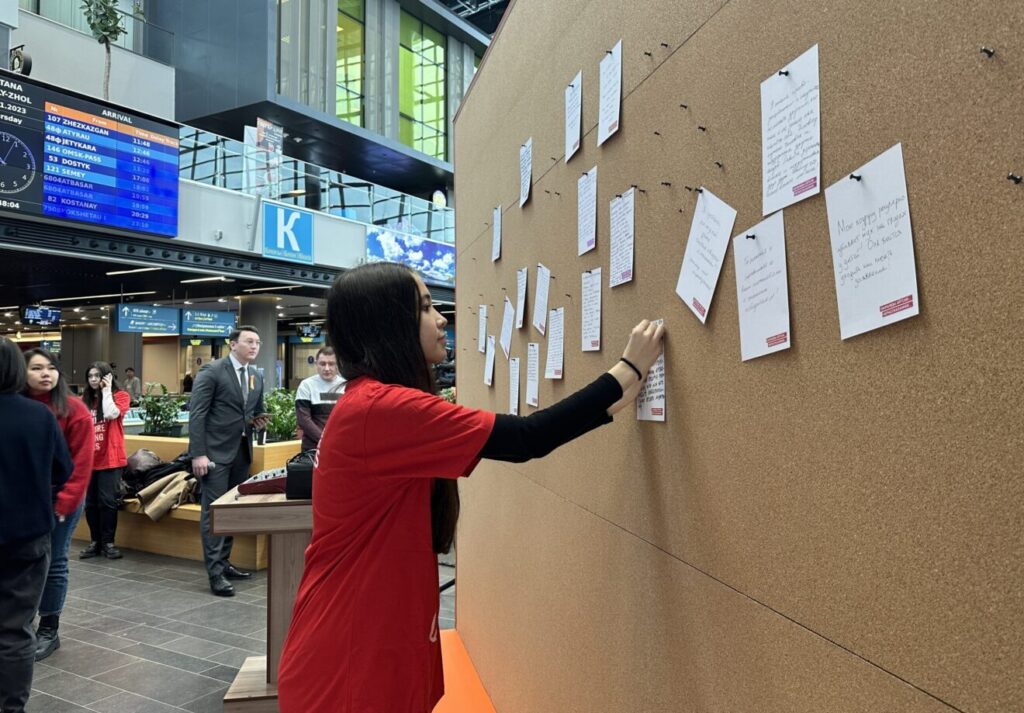ASTANA – The 16 Days of Activism against Gender-Based Violence annual international campaign saw widespread participation and coverage in Kazakhstan, reported the press service of the UN in Kazakhstan.
The campaign began on Nov. 25, the International Day for the Elimination of Violence against Women, and ran through Dec. 10.
A key focus for the UN in Kazakhstan is the elimination of violence against women and girls, supporting the country’s commitment to fulfilling international gender equality obligations.This year’s theme, Taking Active Steps to End Violence Against Women and Girls, underscored the need for unified efforts to combat this issue.
A notable feature was the Untold installation at Astana’s Nurly Zhol railway station encouraged people to speak out against violence towards women by sharing personal experiences anonymously. The organizers of the installation announced plans to use the collected material in their future information campaigns aimed at combating violence against women and girls.
The exhibition organizers included the Office of the UN Resident Coordinator in Kazakhstan, the UN Development Programme, the UN Population Fund, the World Health Organization, UN Women, and the European Union-UN Spotlight Initiative, and Kazakhstan Temir Zholy.
Astana also hosted a conference on the prevention of domestic violence on Nov. 23-24 to discuss the administrative and criminal legislation aimed at minimizing domestic violence in the field of women’s rights and gender equality. Human Rights Commissioner Artur Lastayev noted that Kazakhstan considers protection from domestic violence as one of the key tasks of a socially oriented state. He stressed that domestic violence not only violates human rights but also hinders families and destroys social values.
The final conference of the Regional Program of the EU-UN Spotlight initiative in Central Asia was held on Nov. 29 in the capital. The program has demonstrated significant results over the three years of its implementation.
More than 500 activists and representatives of civil society organizations in the region formed a regional network, while more than 25 youth organizations and activists joined the informal youth network to eradicate harmful stereotypes and gender-based violence. Law enforcement agencies also established a regional community to exchange experience and expertise. Partners, including experts from the health, police, and psychosocial protection service, received research materials, gender analysis of regional legislation, and training packages on implementing standard operating procedures for service provision.
During a Dec. 4 conference on combating gender-based violence in the region, Kazakh officials presented the results of the country’s chairmanship in the Dialogue of Women of Central Asia in 2023. The event coincided with the 16-day global campaign. Daniya Yespayeva, Vice Speaker of the Mazhilis, the lower chamber of the Kazakh Parliament, highlighted the role of the dialogue in institutionally strengthening the regional platform. She commended the work of the UN Regional Center for Preventive Diplomacy for Central Asia (UNRCCA), the United Nations Entity for Gender Equality (UN Women), the UNDP, and the EU.
On Nov. 25, UN Women and Kazakh artist Kanat Nurtazin released a video calling for public attention to various forms of violence, including physical, economic, psychological and online violence.
Nationwide information campaigns, including student engagements, an animated movie presentation, and social media initiatives, were conducted to increase awareness about gender-based violence as part of the global initiative.
Reports indicate that one in six women in Kazakhstan experiences violence every year. In 2022, there were 61,277 reported cases of domestic violence against women. According to the UNDP Report on Gender Social Norms Index, more than 93% of Kazakh citizens, both men and women, hold gender biases against women.
Source : AstanaTimes


